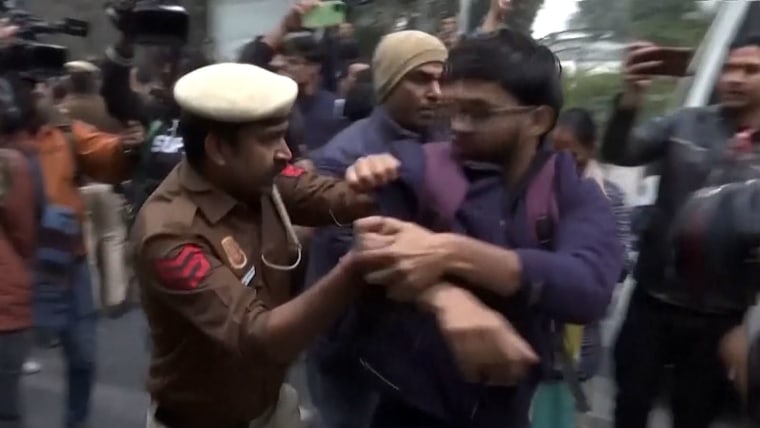[ad_1]
NEW DELHI — India’s tax officials on Thursday left the BBC offices in New Delhi and Mumbai after searching them for three days seeking information about the organization’s business operations amid allegations of tax evasion. Opposition political parties and other media organizations criticized the move as an attempt to intimidate the media.
Television images showed tax officials leaving in cars after spending nearly 60 hours at the BBC office in New Delhi. They made no statement about the searches that started on Tuesday morning.
“The Income Tax Authorities have left our offices in Delhi and Mumbai. We will continue to cooperate with the authorities and hope matters are resolved as soon as possible,” BBC News said on Twitter.
“We are supporting staff — some of whom have faced lengthy questioning or been required to stay overnight— and their welfare is our priority. Our output is back to normal and we remain committed to serving our audiences in India and beyond,” it said.
“The BBC is a trusted, independent media organization and we stand by our colleagues and journalists who will continue to report without fear or favor,” it said.
Prime Minister Narendra Modi’s critics questioned the timing of the searches, which came weeks after the BBC aired a documentary critical of Modi in the U.K.
Kanchan Gupta, an adviser to India’s Information and Broadcasting Ministry, said there was no connection between the two.
“Whether you are a media organization or you are a manufacturer, the purpose of tax laws apply equally to everybody. And if you are found in violation of those tax laws, the appropriate action is taken as the due process of law,” Gupta said in an interview with Mirror Now television news channel.
The Indian tax department hasn’t so far issued any statement on what prompted the searches of the BBC offices.
India’s News Broadcasters and Digital Association criticized the income tax “surveys” at the BBC offices.
While the association “maintains that no institution is above the law, it condemns any attempt to muzzle and intimidate the media and interfere with the free functioning of journalists and media organizations,” it said in a statement on Wednesday.
The main opposition Congress party leader, Mallikarjun Kharge, described the government action as an assault on freedom of the press under Modi’s government.
Reporters Without Borders, an international media watchdog, denounced the Indian government’s action as “attempts to clamp down on independent media.”
“These raids have all the appearance of a reprisal against the BBC for releasing a documentary critical of Prime Minister Narendra Modi three weeks ago. They have come at a time when independent media are being hounded more and more, and when pluralism is shrinking in India due to increased media concentration,” the group said in a statement on Thursday.
The documentary, “India: The Modi Question,” was broadcast in the U.K. last month, examining the prime minister’s role in the 2002 anti-Muslim riots in the western state of Gujarat, where he was chief minister at the time. More than 1,000 people were killed in the violence.
Modi has denied allegations that authorities under his watch allowed and even encouraged the bloodshed, and the Supreme Court said it found no evidence to prosecute him. Last year, the court dismissed a petition filed by a Muslim victim questioning Modi’s exoneration.
The second portion of the two-part documentary examined “the track record of Narendra Modi’s government following his re-election in 2019,” according to the BBC website.
The program drew an immediate backlash from India’s government, which invoked emergency powers under its information technology laws to block it from being shown in the country. Local authorities scrambled to stop screenings organized at Indian universities, and social media platforms including Twitter and YouTube complied with government requests to remove links to the documentary.
The BBC said at the time that the documentary was “rigorously researched” and involved a wide range of voices and opinions.
“We offered the Indian Government a right to reply to the matters raised in the series — it declined to respond,” its statement said.
India’s Foreign Ministry called the documentary a “propaganda piece designed to push a particular discredited narrative” that lacked objectivity.
[ad_2]
Source link

